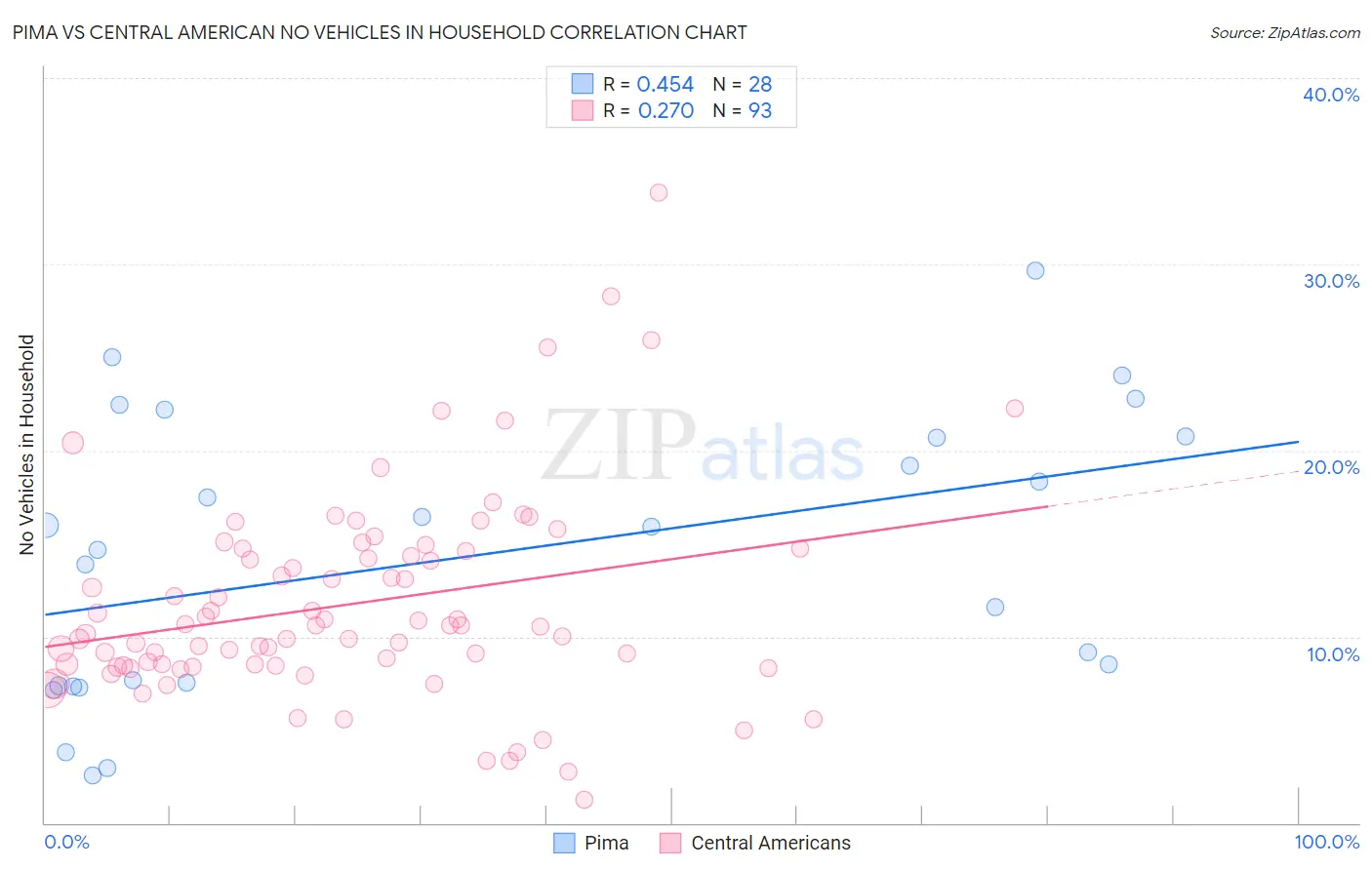Pima vs Central American No Vehicles in Household
COMPARE
Pima
Central American
No Vehicles in Household
No Vehicles in Household Comparison
Pima
Central Americans
14.1%
NO VEHICLES IN HOUSEHOLD
0.0/ 100
METRIC RATING
292nd/ 347
METRIC RANK
10.8%
NO VEHICLES IN HOUSEHOLD
24.3/ 100
METRIC RATING
196th/ 347
METRIC RANK
Pima vs Central American No Vehicles in Household Correlation Chart
The statistical analysis conducted on geographies consisting of 61,491,377 people shows a moderate positive correlation between the proportion of Pima and percentage of households with no vehicle available in the United States with a correlation coefficient (R) of 0.454 and weighted average of 14.1%. Similarly, the statistical analysis conducted on geographies consisting of 502,389,156 people shows a weak positive correlation between the proportion of Central Americans and percentage of households with no vehicle available in the United States with a correlation coefficient (R) of 0.270 and weighted average of 10.8%, a difference of 30.8%.

No Vehicles in Household Correlation Summary
| Measurement | Pima | Central American |
| Minimum | 2.5% | 1.3% |
| Maximum | 29.6% | 33.8% |
| Range | 27.1% | 32.6% |
| Mean | 14.4% | 11.8% |
| Median | 15.3% | 10.6% |
| Interquartile 25% (IQ1) | 7.4% | 8.4% |
| Interquartile 75% (IQ3) | 20.7% | 14.7% |
| Interquartile Range (IQR) | 13.3% | 6.2% |
| Standard Deviation (Sample) | 7.5% | 5.5% |
| Standard Deviation (Population) | 7.4% | 5.5% |
Similar Demographics by No Vehicles in Household
Demographics Similar to Pima by No Vehicles in Household
In terms of no vehicles in household, the demographic groups most similar to Pima are Okinawan (14.1%, a difference of 0.48%), Indian (Asian) (14.1%, a difference of 0.49%), Immigrants from Jamaica (14.2%, a difference of 0.66%), Belizean (14.3%, a difference of 1.5%), and Paraguayan (14.4%, a difference of 1.6%).
| Demographics | Rating | Rank | No Vehicles in Household |
| Immigrants | Eastern Europe | 0.0 /100 | #285 | Tragic 13.6% |
| Colville | 0.0 /100 | #286 | Tragic 13.7% |
| Immigrants | Ireland | 0.0 /100 | #287 | Tragic 13.7% |
| Hopi | 0.0 /100 | #288 | Tragic 13.7% |
| Immigrants | Australia | 0.0 /100 | #289 | Tragic 13.8% |
| Indians (Asian) | 0.0 /100 | #290 | Tragic 14.1% |
| Okinawans | 0.0 /100 | #291 | Tragic 14.1% |
| Pima | 0.0 /100 | #292 | Tragic 14.1% |
| Immigrants | Jamaica | 0.0 /100 | #293 | Tragic 14.2% |
| Belizeans | 0.0 /100 | #294 | Tragic 14.3% |
| Paraguayans | 0.0 /100 | #295 | Tragic 14.4% |
| Immigrants | Spain | 0.0 /100 | #296 | Tragic 14.5% |
| Immigrants | Panama | 0.0 /100 | #297 | Tragic 14.6% |
| Moroccans | 0.0 /100 | #298 | Tragic 14.7% |
| Immigrants | Greece | 0.0 /100 | #299 | Tragic 14.7% |
Demographics Similar to Central Americans by No Vehicles in Household
In terms of no vehicles in household, the demographic groups most similar to Central Americans are Shoshone (10.8%, a difference of 0.040%), Immigrants from Sweden (10.8%, a difference of 0.25%), Immigrants from Brazil (10.8%, a difference of 0.34%), Pueblo (10.8%, a difference of 0.45%), and Immigrants from Asia (10.9%, a difference of 0.56%).
| Demographics | Rating | Rank | No Vehicles in Household |
| Immigrants | Eritrea | 36.3 /100 | #189 | Fair 10.6% |
| Immigrants | North Macedonia | 34.6 /100 | #190 | Fair 10.6% |
| Immigrants | Northern Europe | 33.1 /100 | #191 | Fair 10.7% |
| Carpatho Rusyns | 32.1 /100 | #192 | Fair 10.7% |
| Ukrainians | 28.0 /100 | #193 | Fair 10.7% |
| Pueblo | 27.0 /100 | #194 | Fair 10.8% |
| Immigrants | Brazil | 26.3 /100 | #195 | Fair 10.8% |
| Central Americans | 24.3 /100 | #196 | Fair 10.8% |
| Shoshone | 24.1 /100 | #197 | Fair 10.8% |
| Immigrants | Sweden | 22.9 /100 | #198 | Fair 10.8% |
| Immigrants | Asia | 21.3 /100 | #199 | Fair 10.9% |
| Cambodians | 19.6 /100 | #200 | Poor 10.9% |
| Immigrants | Western Europe | 19.1 /100 | #201 | Poor 10.9% |
| Romanians | 17.9 /100 | #202 | Poor 10.9% |
| Iroquois | 17.6 /100 | #203 | Poor 10.9% |